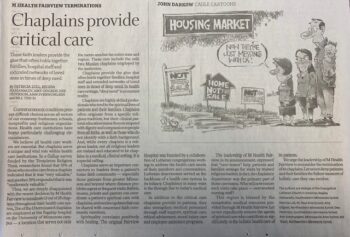By Minneapolis Area Synod Bishop Ann Svennungsen, Southeastern Minnesota Synod Bishop Regina Hassanally, Saint Paul Area Synod Bishop Patricia Lull, Northeastern Minnesota Synod Bishop Amy Odgren , Southwestern Minnesota Synod Bishop Dee Pederson, and Northwestern Minnesota Synod Bishop Bill Tesch
Current economic conditions present difficult choices to leaders across all sectors of our economy: businesses, schools, nonprofits, and religious organizations. Healthcare institutions have borne a particularly challenging set of circumstances recently.
We believe all healthcare workers are essential. But there is a unique and vital role that chaplains serve within healthcare institutions. In a Gallup survey funded by the Templeton Religion Trust, researchers found that 55% of those who receive care from a chaplain indicated that it was “very valuable,” and another 31% responded that it was “moderately valuable.”
Thus, we are deeply disappointed with and concerned about the recent decision by M Health Fairview to terminate 13 out of 28 chaplains throughout their healthcare system. Ten of the 13 terminated chaplains are employed at the flagship hospital on the University of Minnesota campus – a location that serves not only the metro area but the entire state and region. These cuts include the only two Muslim chaplains employed by the institution.
CHAPLAINS PROVIDE THE glue that often hold together families, hospital staff, and extended networks of loved ones in times of deep need. In healthcare settings, “deep need” is a constant reality.
Chaplains are highly skilled professionals who tend to the spiritual lives of patients and their families. Chaplains often originate from a specific religious tradition, but their clinical pastoral education trains them to respond with dignity and compassion to people from all faiths, as well as those who do not identify with a faith background. And, while every chaplain is a religious leader, not all religious leaders are trained and educated to be chaplains in a medical, clinical setting. It is a special calling.
Chaplains serve as important connectors to leaders from a patient’s home faith community – especially those patients from Greater Minnesota and beyond where distance prohibits urgent or frequent visits. Rabbis, imams, priests, and pastors can coordinate a patient’s spiritual care with chaplains, and receive updates that can be shared with concerned faith community members.
Spirituality correlates positively with health and healing. The original Fairview Hospital was founded by a collaboration of Lutheran congregations working to address the healthcare needs of their members and communities. Lutheran deaconesses served as the backbone of a health care system in its infancy. Chaplaincy in many ways is the through line to today’s medical care.
In addition to the critical care chaplains provide to patients, they also strengthen medical personnel through staff support, spiritual care, ethical advisement, moral injury care, and employee assistance programs.
The leadership of M Health Fairview, in its announcement, expressed that “care teams” help patients and families arrange for visits by trusted religious leaders. In fact, the chaplaincy department was the primary part of those care teams. Who will now ensure such visits take place – overworked nursing staff?
This region is blessed by the remarkable medical resources provided through M Health Fairview. Let us not expediently remove the agents of spiritual care who contribute so significantly to the holistic health care of its patients.
We urge the leadership of M Health Fairview to reconsider the termination of its chaplains and to restore those positions. Let us not deny patients and their families the fullest measure of holistic care they can receive.
——————————–
For those who have access behind the paywall of the Minneapolis Star Tribune: https://www.startribune.com/chaplains-provide-critical-care/600322721/?refresh=true
